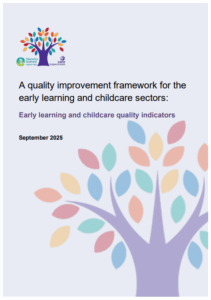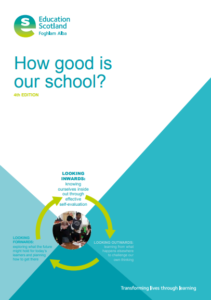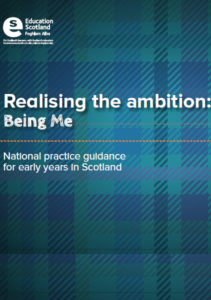Section 3 What I need to develop (Independence)
Wellbeing – my social, emotional and communication development
p26
Interactions – Notice how I observe and respond to your voice, words and expressions. You help me to learn to communicate and find my words by modelling empathy. I am learning from you how to be kind, calm and caring. I need you to support my developing understanding of the range of emotions that myself and other people experience. With your help I am developing an empathic understanding of the thoughts, feelings and intentions of others. I am beginning to develop an awareness of how to work with others when we are playing together. You help me to recognise when others are displaying strong emotions and you encourage me to find ways to relate to and resolve any tensions.
p27
Experiences – I understand and respond to the routines of my day. I need you to involve me in these routines and develop my sense of ownership and independence.
Respond to my mealtime and personal care needs in a calm, patient, dignified and unhurried way. I am enjoying becoming more independent and learning to ask for help if I need it. Such times are key in building a positive, trusting relationship with me. Take time to talk with me, explain what’s happening and encourage my independence.
Spaces: I need spaces where I can relax, feel safe, happy, content and cosy and which give a sense of care and wellbeing. These spaces can be accessed independently by me when I feel the need to regulate myself.
My Movement and coordination development
p28
Experiences – I am reassured by the routines of my day. Routines continue to help me mark the passing of time and give me comfort. Notice how the processes of the routines of the day provide opportunities for fine and gross motor skill development, for example encouraging me to become independent in dressing in my outdoor clothes. P28
Promoting my confidence, creativity and curiosity
p30
Interactions – Be aware that the simplest of experiences for you are often full of potential for me. Observe my actions sensitively and intervene when necessary to extend my thinking without over-direction. Try not to interrupt my moments of intense concentration. Use techniques such as sustained shared thinking; wondering aloud, explaining what is happening – but all the time allowing me to find out for myself what will happen next
Carefully observe my play to know when best to stand back, give me time, and allow me to investigate for myself – and notice the moments when I’m receptive to more support. Encourage my ideas, allow me to make mistakes. Offer me further suggestions and praise my attempts. Listen with your eyes. Pose questions which encourage my inquiry, such as, I wonder why you think that, to extend my emerging ability to verbalise my thoughts and actions. Say I wonder what happens if… to help me make sense of what happens when I try things out. Help model techniques and strategies with me to encourage this new learning in my new challenges or suggest a new context through introducing a provocation.
p31
Experiences – Help me understand how things work, for example, how objects can be moved transported around; how similar things can be grouped together, how things balance. Provide me with open-ended resources I enjoy such as bags boxes and containers to put smaller items in, to move, to empty out, to scatter about. See the potential for wonder and promoting my confidence and independence through everyday routine experiences such as getting ready to go outside or during mealtimes. See what I can already do for myself and give me time to develop these skills.
Spaces – I need access to a variety of interesting spaces, both indoors and outdoors, filled with open-ended opportunities for me to explore and inquire, for example, the properties of sand, water, clay. Carefully consider and review my play spaces. Arrange indoor furniture and outdoor fixtures sensitively in response to my needs and place objects within my reach. Encourage me to share my ideas about the spaces I play and rest in. Give me frequent access to resources in which I show interest until I come to a self-satisfying conclusion.



